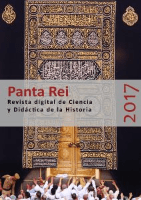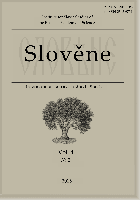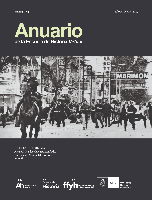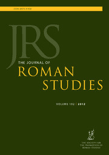
Panta Rei-Digital Journal of History and Didactics of History
Scope & Guideline
Unveiling the past, enriching the present.
Introduction
Aims and Scopes
- Interdisciplinary Approaches to History Education:
The journal emphasizes the integration of various disciplines, such as archaeology, sociology, and political science, into historical study and teaching methodologies. - Focus on Historical Thinking and Critical Skills:
It promotes the development of historical thinking skills among educators and students, fostering critical engagement with historical narratives and sources. - Exploration of Cultural Heritage and Memory:
The journal investigates how cultural heritage and collective memory shape historical understanding and teaching practices, particularly in diverse and conflict-affected contexts. - Innovative Didactic Strategies:
There is a consistent focus on innovative teaching methods, including the use of digital tools, role-playing, and dialogical approaches to enhance history education. - Comparative Studies in Historical Education:
The journal publishes comparative studies that evaluate different educational contexts and pedagogical strategies across various countries and cultures.
Trending and Emerging
- Teaching Recent Historical Conflicts:
There is a growing emphasis on teaching recent historical conflicts, highlighting the importance of understanding contemporary issues through historical lenses, which is crucial for developing critical citizenship. - Intersections of History, Gender, and Power:
Emerging themes focus on the relationships between history, gender, and power dynamics, indicating a shift towards inclusivity and representation in historical narratives and education. - Digital Humanities and History Education:
The integration of digital tools and methodologies in teaching history has gained traction, with research exploring how technology can enhance engagement and learning outcomes in history classrooms. - Decolonization of Historical Narratives:
An increasing number of studies are addressing the decolonization of history education, reflecting a broader movement to challenge Eurocentric narratives and incorporate diverse perspectives. - Lifelong Learning in Historical Contexts:
The journal is trending towards themes of lifelong learning and the continuous development of historical thinking skills among educators, emphasizing the importance of adaptability in teaching practices.
Declining or Waning
- Traditional Historical Narratives:
There has been a noticeable decline in papers focusing solely on traditional historical narratives without a pedagogical angle, indicating a shift towards more interactive and critical approaches to history. - Purely Theoretical Historical Frameworks:
Research that purely discusses theoretical frameworks without practical application in teaching contexts appears to have waned, as the journal increasingly favors studies with direct implications for educators. - Focus on Prehistoric or Ancient History in Isolation:
While ancient history remains a topic of interest, there seems to be a reduction in articles that do not connect these topics to contemporary educational practices or current societal issues. - Single-Country Studies Without Comparative Elements:
The publication of studies that focus exclusively on a single country’s history education without comparative analysis has decreased, suggesting a preference for broader, global perspectives. - Emphasis on Non-Didactic Historical Research:
There is a diminishing presence of research that does not directly relate to didactics or teaching practices, as the journal continues to prioritize contributions that enhance educational methodologies.
Similar Journals

South African Journal of Cultural History
Unveiling the Layers of South Africa's Cultural HistorySouth African Journal of Cultural History is a leading forum dedicated to the exploration and analysis of cultural history within the diverse context of South Africa. Published by the SOUTH AFRICAN SOCIETY FOR CULTURAL HISTORY, this journal serves as an essential resource for researchers, professionals, and students interested in understanding the intricate past that shapes contemporary societies. With an emphasis on interdisciplinary studies, it encourages contributions that delve into various aspects of cultural heritage, identity, and social dynamics. While currently not an open-access publication, the journal aims to provide insightful articles that foster academic discourse and promote the preservation and appreciation of South Africa's rich cultural history. By engaging with this journal, scholars can connect with a vibrant community committed to advancing knowledge in cultural history and enhancing the visibility of South African cultural narratives on a global scale.

Historia-Santiago
Advancing Scholarship on Latin American NarrativesHistoria-Santiago is an esteemed academic journal published by the Pontificia Universidad Católica de Chile, Instituto de Historia. Since its inception in 2000, the journal has embraced an Open Access model, facilitating broad dissemination of historical research and ensuring that critical scholarly work is freely accessible to researchers, professionals, and students around the globe. With a focus on Latin American history, Historia-Santiago provides a platform for innovative research and contributions that engage with diverse historical narratives and methodologies. The journal aims to foster interdisciplinary dialogue and stimulate scholarly debate, thereby enriching the understanding of historical contexts and their implications in contemporary society. By maintaining high academic standards, Historia-Santiago occupies a vital role in the field of historical studies, encouraging authors to explore new ideas and perspectives that shape the understanding of our past.

Vestnik Permskogo Universiteta-Istoriya-Perm University Herald-History
Illuminating the Past, Shaping the FutureVestnik Permskogo Universiteta-Istoriya (Perm University Herald-History), published by Perm State National Research University, serves as a pivotal academic platform for scholars in the fields of History, Archaeology, and Cultural Studies. With an ISSN of 2219-3111 and an impressive trajectory of convergence from 2019 to 2024, this journal has secured a commendable Q1 ranking in History and is recognized in the Q2 quartile across multiple relevant categories, demonstrating its significance in the scholarly landscape. Despite the absence of an open access model, the journal remains highly impactful and continues to contribute richly to the discourse surrounding historical and cultural research within the Russian Federation and beyond. The journal publishes original research, reviews, and theoretical papers, making it essential reading for those engaged in historical studies and related fields.

STUDI STORICI
Defining Excellence in Historical ResearchSTUDI STORICI, published by CAROCCI EDITORE SPA, is a distinguished journal in the field of History, recognized for its contributions to historical scholarship since its inception in 1966. With an ISSN of 0039-3037 and an E-ISSN of 2036-458X, this journal is acclaimed for delving into various historical themes and methodologies, making notable influences in both academic research and public discourse. It holds a commendable Q2 ranking in the 2023 Scopus category for History, placing it in the top tier of historical research journals. The journal’s curated articles span a wide range of historical periods and contexts, providing critical insights and fostering scholarly dialogue among researchers, professionals, and students alike. Despite not being open access, STUDI STORICI remains an essential resource for anyone seeking to engage with the complexities of history and its implications in contemporary society. Based in Rome, Italy, at VIA SARDEGNA 50, 00187, it continues to uphold a rich legacy of excellence instrumental in shaping the field.

Slovene-International Journal of Slavic Studies
Pioneering Research in Slavic Linguistics and MoreThe Slovene-International Journal of Slavic Studies, published by the Russian Academy of Sciences, Institute of Slavic Studies, serves as a vital platform for scholarly discourse in the fields of Cultural Studies, History, Linguistics, and Religious Studies. Since its transition to Open Access in 2012, the journal has enriched academic dialogue, enabling wider circulation and accessibility of research findings. Based in the Russian Federation, the journal supports interdisciplinary approaches, inviting contributions that push the boundaries of traditional Slavic studies. With a commendable ranking in the Q3 quartile across multiple categories as of 2023 and respectable Scopus rankings, it stands out as a crucial resource for researchers and students alike, enhancing their understanding of Slavic and related cultural contexts. The journal's commitment to fostering international collaboration and dialogue positions it as an invaluable asset for anyone engaged in the complexities of Slavic studies.

Revista Historia-Debates e Tendencias
Fostering Critical Dialogues in Historical ScholarshipRevista Historia-Debates e Tendencias is a prestigious academic journal dedicated to the study of historical themes, discourses, and trends in the field of history and social sciences. Published by UNIV PASSO FUNDO, this journal has been a vital resource for scholars and practitioners in Brazil and beyond since it transitioned to an Open Access model in 2007, ensuring that research is freely accessible to all. With its ISSN 1517-2856 and E-ISSN 2238-8885, the journal aims to foster critical discussions and inter-disciplinary dialogues on historical narratives, methodologies, and perspectives. By providing a platform for both emerging and established researchers, it plays an essential role in advancing the field of history while contributing to the global academic community. As a publication that encourages innovative research and scholarly debate, Revista Historia-Debates e Tendencias serves as an indispensable tool for anyone engaged in historical inquiry and analysis.

Anuario de la Escuela de Historia Virtual
Unlocking the Past Through Open Access ScholarshipAnuario de la Escuela de Historia Virtual is a distinguished academic journal published by the Universidad Nacional de Córdoba, Facultad de Filosofía y Humanidades. With its focus on the field of history, this peer-reviewed journal aims to foster scholarly discussion and disseminate innovative research that contributes to the understanding of historical contexts and narratives. Since transitioning to an Open Access model in 2010, it has greatly increased accessibility for researchers, professionals, and students, thereby promoting a greater exchange of knowledge across linguistic and geographical boundaries. Published under the ISSN 1853-7049, the journal provides invaluable insights into historical analysis, methodologies, and interdisciplinary approaches, ensuring its relevance in contemporary academic discourse. Its commitment to high-quality, impactful research positions it as a vital resource within the historical scholarship landscape.

JOURNAL OF ROMAN STUDIES
Fostering Insights into the Roman ExperienceThe JOURNAL OF ROMAN STUDIES, published by Cambridge University Press, is a prestigious academic journal dedicated to the exploration of the Roman world through archaeological, historical, and literary lenses. With a rich publication history dating back to 1911, this journal has established itself as a leading platform for groundbreaking research in the fields of Classics, History, and Visual Arts, holding Q1 rankings in multiple categories as of 2023. Scholars from around the globe rely on its rigorous peer-reviewed articles to inform their work and advance the understanding of Roman culture and society. Although it operates under a traditional access model, the journal's impact factor and broad bibliographic reach ensure that it remains an invaluable resource for researchers, students, and professionals alike. With its continued commitment to excellence, the JOURNAL OF ROMAN STUDIES not only contributes to academic discourse but also invites new insights into the timeless relevance of Roman studies.

Radovi-Zavoda za Hrvatsku Povijest
Innovative Insights into Croatia's Historical NarrativeRadovi-Zavoda za Hrvatsku Povijest, published by the Institute of Croatian History within the Faculty of Humanities and Social Sciences, is a distinguished open-access journal dedicated to advancing scholarly discourse in the field of history, with a specific focus on Croatian heritage and historiography. Established in 1971, this journal has evolved to become a vital resource for researchers, professionals, and students alike, showcasing innovative research and critical perspectives on historical developments in Croatia and the broader region. With an ISSN of 0353-295X and a recent Scopus ranking placing it in the Q3 quartile for 2023, it stands as a testament to the rich historiographical contributions emerging from Croatia. By providing immediate open access to its content, Radovi-Zavoda za Hrvatsku Povijest seeks to enhance the visibility and impact of historical research, facilitating knowledge exchange and academic collaboration. The journal's commitment to excellence is reflected in its rigorous peer-review process, ensuring that all published works meet high academic standards. As the journal continues to converge from 2013 to 2023, it solidifies its role as a key player in the global historical narrative.

BULGARIAN HISTORICAL REVIEW-REVUE BULGARE D HISTOIRE
Unveiling Bulgaria's Past: A Scholarly Journey Through TimeBULGARIAN HISTORICAL REVIEW - REVUE BULGARE D HISTOIRE is a distinguished journal published by the PUBL HOUSE BULGARIAN ACAD SCI, providing a critical platform for the exploration and analysis of historical narratives pertinent to Bulgaria and its broader regional context. With an ISSN of 0204-8906, this journal has been a reservoir of scholarly research since its inaugural issue, recently covering years from 2001 to 2007 and again from 2009 to 2023. Despite its classification in the Q4 category of History, it uniquely contributes to understanding and preserving historical insights, as reflected in its modest but growing impact in the academic community, where it currently ranks #1405 out of 1760 in Scopus Analytics. The journal aims to engage researchers, professionals, and students by presenting a diverse array of articles, encouraging scholarly discourse that sheds light on historical complexities and advancements. While it currently does not adopt an open-access model, it remains a crucial resource for those engaged in historical studies, particularly in Eastern European contexts.